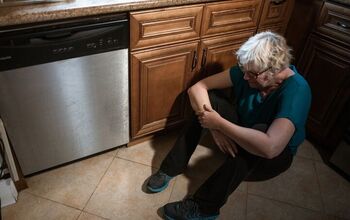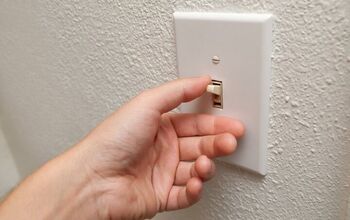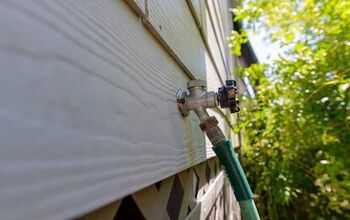Is There A Sulfur Smell In The Bathroom? (Find Out Why)

Sometimes when you’re trying to enjoy the sanctuary of your bathroom, you come across an uncomfortable smell. The smell is actually sulfur, and it can be anywhere and everywhere. It can be a smell that can make your bathroom an unpleasant place to do your business.
A sulfur smell in the bathroom can be from decomposing bacteria that creates sulfur gas. You can find it in contaminated water and pipes and standing water. You can get rid of the sulfur smell using home remedies, but you may need to call a professional.
We’re going to do an investigation and figure out what you can do about that funky scent of rotten eggs. There are various reasons, some man-made, that can cause your bathroom to smell of sulfur. Reading on, you may be able to figure out what is causing it and how to fix it.
Do You Need to Hire a Plumber?
Get free, zero-commitment quotes from pro contractors near you.

What Is Sulfur?
What is sulfur, and why is it making your bathroom smell off? To be specific, it’s called hydrogen sulfide or sewer gas. By the name alone, you can tell it will not be a pleasant scent you want hanging around.
Sulfur develops because of bacteria in the ground or your sewage. It is most commonly found in your water pipes. Sulfur is a common gas or smell that permeates bathrooms and kitchens for a reason.
Due to food, hair, and bodily fluids that go down the pipes, the sulfur gas can rise. Conversely, a leak or mold can also cause a sewer smell, which may lead to a bigger problem. Either way, if you smell sulfur, direct action may need to be taken.
Is Sulfur Organic?
Yes, it’s organic, but not the good kind of organic like you’d share and post pictures of. This contaminated water is not photogenic nor safe. The sulfur gas can cause nausea, headaches, and dizziness.
Luckily the human nose can easily detect this type of gas. Our noses can usually pick up sulfur at its lowest levels. The amount you find in your bathroom isn’t enough to be fatal, but it can be toxic in some instances.
Before we start hating on sulfur completely, we must consider that sulfur is necessary for our digestive system. Some foods are more work than others to break down. Meats, dairy, and some vegetables can cause the same kind of smelly eggy gases during the digestive process.
Do You Smell Sulfur In One Place Or Everywhere?
In looking for the source of a sulfur smell, you may find that the odor comes from a sink or your surroundings. Understanding if it is an isolated event or in multiple locations may mean the difference in treating it. Finding the source is where your detective work comes in handy.
Cleaning and some Drano might be just the ticket if the sulfur smell comes from a sink. However, if the water seems to smell, you may have to go to all fixtures and test it. This may mean you need someone to test your water or replace your pipes.
Either way, bacteria is growing and decomposing either a clog or the pipes in the home. To tell if it is purely in the lines, find out if the smell comes when you flush or rinse. If the aroma comes, it can tell you a lot with just this simple test.
Can You Deal With A Sulfur Smell In The Bathroom Yourself?
Some people might choose to deal with the sulfur smell by using air fresheners and scented candles. However, this will only mask the smell instead of dealing with the problem at its source. Many homeowners have successfully eliminated the odor with the use of the good old baking soda and vinegar.
Baking soda is known to absorb foul odors. Using baking soda, vinegar, and hot water is a simple fix to getting rid of the sulfur smell temporarily. The chemical reaction with the vinegar can further kill and break down the bacterial properties of the sulfur.
For those not afraid to reach for more potent chemicals, there are many options. There are many types of products that help clean and maintain these problem areas. Disinfecting soaps, gels, powders, and tablets are found at your local store to help.
Sulfur is contaminated water, and you need to eliminate it at its source. Therefore, finding the cause is your best bet to combat this bathroom funk. Taking time to pinpoint problem areas can help minimize the threat of returning odors.
When Is It Time To Call A Professional For A Sulfur Smell In Bathroom?
Once you have inspected possible sulfur smell causes in your home, it may be time to call a professional. A plumber may be the only one able to detect the source of the stench. In most cases, it may be an easy fix.
A clog or broken seal may be manageable and easily repaired. Sometimes the issue needs a capped pipe and cutting an unused portion to eliminate the problem. Piping and capping is work only a professional plumber can and should do.
Along with fixing and capping pipes, a professional can look for and detect water under your flooring. If the odor is coming from a dirty drain or water underfoot can help determine what needs attention. Water can find its way anywhere and is known to hide in cracks and damp areas in the bathroom.
Your plumber will use ground microphones, Zircons Electronic Detector, and listening discs to look for or hear water. They may be the only ones to find molding water that may lead to the sulfur smell. Unfortunately, plumbers can cost you some money, but it may be worth it.
What Will A Professional Cost?
The cost all depends on the actual cause of the problem and the hourly rate of the professional you hire. Plumber’s rates can range from $45-$150 an hour because the problem is genuinely unknown. At first, it can be hard to gauge cost just by initial look and estimate.
Unclogging toilets and drains can run from $50 – $450. The age of the home can factor into how much work may need to be done. Newer homes can run anywhere from $2000 – $15,000.
At high rates, it’s easy to see why homeowners would try to fix the problem themselves. Still, sometimes knowing when to contact a professional may save you money in the long run. Regular maintenance would also help minimize these types of plumbing problems.
By keeping the pipes clear and minimizing the need for these types of repairs, you may save yourself money. Some things are inevitable, and the age of your home can hinder certain things. Calling a professional plumber is sometimes the right call.
You Might Need To Make A Personal Choice
If you are in an area that experiences seasonal waterfall, you may smell sulfur more often. Living in an older home with poor drainage or plumbing can be a common reason for a sulfur smell. Sulfur occurs in good old Mother Nature to break down waste, and you cannot escape nature.
When standing water combines with the cold, dense air and wind, the smell may be impossible to control. It may be clear that you aren’t going to win the fight against smelly gas. This may mean you have to decide if you can live with it and its effects on your health.
Interestingly enough, Mother Nature is not the only outside cause of this odor. If you are downwind from factories or farms, their waste management tactics can be less than adequate. Even facilities that have top-of-line million-dollar equipment can never really eliminate the odor.
The smell can be affecting many other homes in the area. Filing complaints may be in order but keep in mind that your neighbors have probably tried as well. The city may have already addressed the smell, and it’s just not going to go away.
Do You Need to Hire a Plumber?
Get free, zero-commitment quotes from pro contractors near you.

Related Questions
Why does my bathroom smell musty?
That musty smell you may be experiencing is due to mold or mildew. Eliminating a musty odor can be an easy fix by constantly cleaning and maintaining your bathroom. From using the toilet to washing up in the shower, mildew or mold can form from constant water use.If the smell seems to grow or get stronger, you may need to call a plumber. It is common for water to leak under tile and behind shower walls which causes problems for you. Using special equipment, a plumber can detect water leaks and possible mold harmful to your health.
Why does my home feel muggy?
A simple answer is that there are too many people in your home. Warm bodies can cause the temperature to rise and contribute to the moisture in the air. These issues can make the air feel heavy and muggy.Another reason is that it is humid outside. A lot of rainfall or warm temperatures can cause your house to pull in the moist air and give a feeling of heaviness. The leading top-of-line cause is leaving doors and windows open and drawing in the wet, muggy air.
Related Guide

Stacy Randall is a wife, mother, and freelance writer from NOLA that has always had a love for DIY projects, home organization, and making spaces beautiful. Together with her husband, she has been spending the last several years lovingly renovating her grandparent's former home, making it their own and learning a lot about life along the way.
More by Stacy Randall



























